theartsdesk in Estonia: Tallinn Music Week 2016 | reviews, news & interviews
theartsdesk in Estonia: Tallinn Music Week 2016
theartsdesk in Estonia: Tallinn Music Week 2016
A Presidential exhortation to save our Europe and our freedom
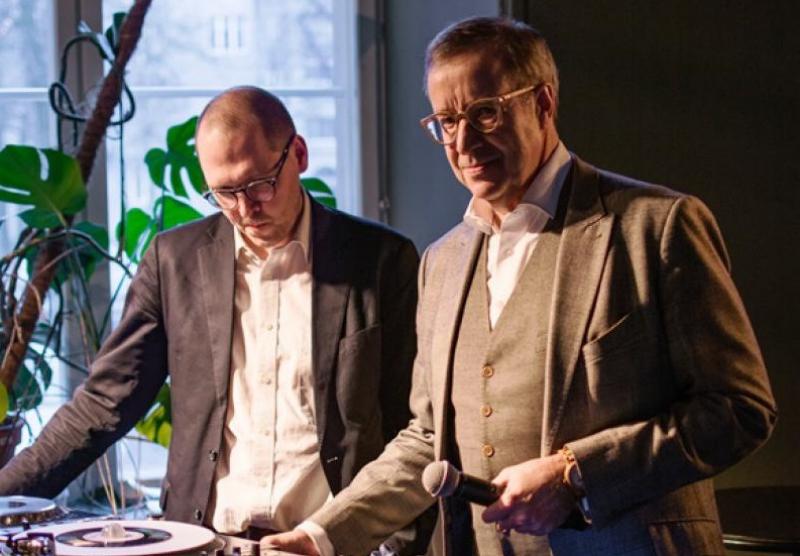
“If we want to keep this free and democratic Europe of ours free and democratic, we must enlist ourselves, our skills and our commitment to liberty and justice. The problems we face are too great to simply say let the politicians do it.
Now in its eighth year, Tallinn Music Week is a showcase festival: an event designed to show off a country or region’s music, or a style of music. For Ilves, the gathering is innately political: “We all need to use our creativity, be it musical, artistic, entrepreneurial or technological to make a change for the better. If a playwright like Václav Havel can liberate a whole country, certainly an army of creative people can save our Europe and our freedom.” He had begun his speech by broaching the killings at the Paris Eagles of Death Metal concert, saying: “Those 89 people were just like you and me, people who listened to something other than what your average radio station would play.”
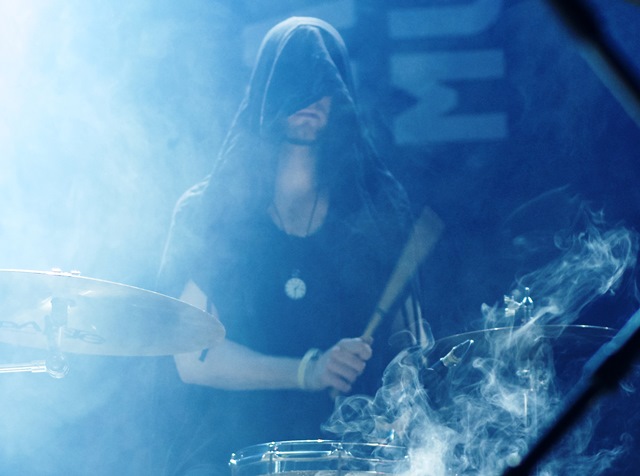 Fast-forward eight hours. The President is revealing his personal radio station's playlist. Behind DJ decks, he is airing tracks from Teenage Wasteland, the charity-benefitting compilation album he recently assembled as a retrospective soundtrack for his years growing up in the US. By his side stands DJ Drummie who, as Andres Vosman, was his security adviser and is also a veteran underground dance DJ. It's surreal. This is a President. A President playing records from the edgier end of the canonical. There are selections from the album: The Troggs’ “Wild Thing” and David Bowie’s “Panic in Detroit”. Some songs are not: Creedence Clearwater Revival’s “Fortunate Son”, Neil Young’s “Cinnamon Girl” and Plastic Bertrand’s “Ça Plane Pour Moi”. Before and after each, he explains what the track is and what it means to him. The link between Neil Young and grunge is outlined.
Fast-forward eight hours. The President is revealing his personal radio station's playlist. Behind DJ decks, he is airing tracks from Teenage Wasteland, the charity-benefitting compilation album he recently assembled as a retrospective soundtrack for his years growing up in the US. By his side stands DJ Drummie who, as Andres Vosman, was his security adviser and is also a veteran underground dance DJ. It's surreal. This is a President. A President playing records from the edgier end of the canonical. There are selections from the album: The Troggs’ “Wild Thing” and David Bowie’s “Panic in Detroit”. Some songs are not: Creedence Clearwater Revival’s “Fortunate Son”, Neil Young’s “Cinnamon Girl” and Plastic Bertrand’s “Ça Plane Pour Moi”. Before and after each, he explains what the track is and what it means to him. The link between Neil Young and grunge is outlined.
The President is 62, and was born in Sweden to Estonian refugees who arrived there during the Soviet Union’s post-World War II occupation of their country. He grew up in and was educated in the USA. When Estonia achieved independence in 1991, he lived in Germany and worked for Radio Free Europe. In 1993, he became Estonia’s Ambassador to America. After a spell serving as a member of the European Parliament, he was elected President of Estonia in 2006. Music colours his world. During the punk years, he frequented New York’s Mudd Club. Nothing in his trajectory fits the norm. At this year’s Tallinn Music Week, he was at the front during a pummelling set by Finland’s ominous Krautrock-acid house musical steamroller K-X-P (pictured above right, photo © Martin Lehari). This politician leads by example.
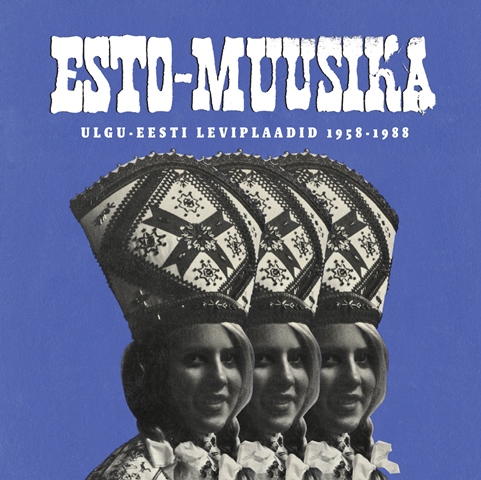 In this city and as part of this event, it all makes sense. For Ilves, as it is with Tallinn Music Week, the day-to-day, the cultural and the political are one. It’s just that his slant on the cultural allows room for the personal more than most world leaders.
In this city and as part of this event, it all makes sense. For Ilves, as it is with Tallinn Music Week, the day-to-day, the cultural and the political are one. It’s just that his slant on the cultural allows room for the personal more than most world leaders.
Ilves’s international background and roots in Estonia's diaspora is reflected by another album also promoted at Tallinn Music Week alongside Teenage Wasteland. The extraordinary and wonderful triple-CD set Esto-Muusika Ulgu-Eesti Leviplaadid 1958-1988 (pictured above left) collects recordings made by Estonia's dispersed communities and provides a very different soundtrack for the country’s expatriate population than that of the President’s. One not featuring The Velvet Underground. Everything is in Estonian, whether recorded in the US or Sweden where Ilves lived, or Argentina, Australia or Canada. The small, transplanted Estonian-speaking populations could buy Joni Mitchell covers, a translated “These Boots are Made for Walking” or folk-styled recordings made for the tiny local markets.
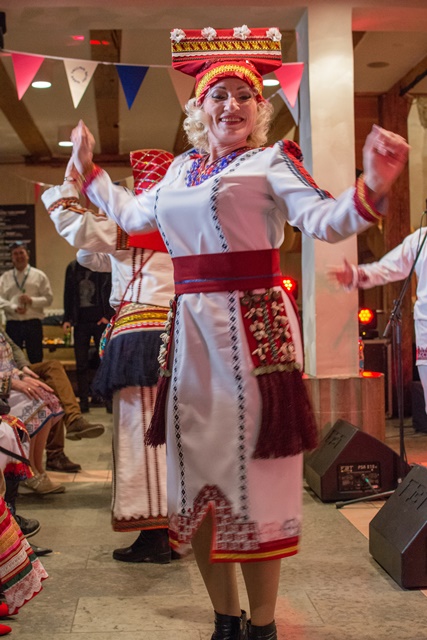 Like other detached populations, Estonians wanted to retain their identity. The issue was relevant at home too. At various points before independence, Estonia been under the control of Denmark, Sweden, Russia and Nazi Germany. Having a Finno-Ugric language has helped embed the distinctiveness: it has ties with Finnish, Hungarian and Sámi. In Russia, President Putin has Finno-Ugric in his ancestry. At Tallinn Music Week, an evening dedicated to Finno-Ugria stressed Estonia does not see itself apart. These poignant thoughts aside, it is impossible not to be swept along by the verve of the traditional Russian Finno-Ugric group Toorama. (Pictured right, Toorama's enthusiastic audience, photo © Kristjan Indus.)
Like other detached populations, Estonians wanted to retain their identity. The issue was relevant at home too. At various points before independence, Estonia been under the control of Denmark, Sweden, Russia and Nazi Germany. Having a Finno-Ugric language has helped embed the distinctiveness: it has ties with Finnish, Hungarian and Sámi. In Russia, President Putin has Finno-Ugric in his ancestry. At Tallinn Music Week, an evening dedicated to Finno-Ugria stressed Estonia does not see itself apart. These poignant thoughts aside, it is impossible not to be swept along by the verve of the traditional Russian Finno-Ugric group Toorama. (Pictured right, Toorama's enthusiastic audience, photo © Kristjan Indus.)
With music, the name immediately coming to mind in association with Estonia's world-wide profile is the composer Arvo Pärt, the country’s most well-known cultural export. He had his struggles with the occupiers and spent much of the 1980s and 1990s in Germany. His presence is felt close to Tallinn: a 45-minute drive west of the city reaches a lane cut through a forest which ends up at a large but unassuming garage and house surrounded by trees. This is The Arvo Pärt Centre, the home of his archive. He also works there – the icons inspiring him sit upon a piano in a corner (pictured below left).
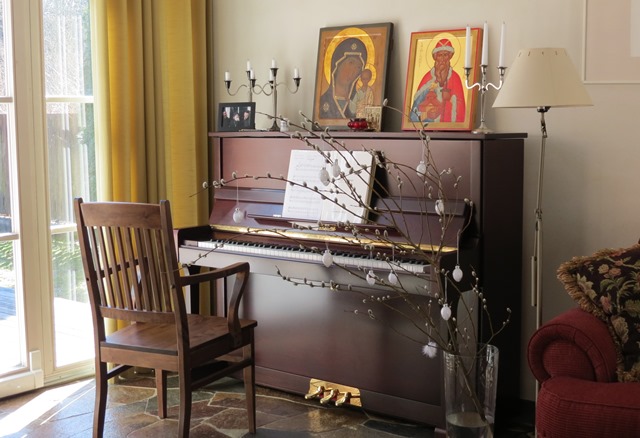 As unlikely as it is, the buildings used to belong to the owner of a swimming-pool company. The 2008 recession had its effect on that market and they were sold in 2009. Currently, this is an archive as such but publicly accessible buildings are in the development phase. A complex designed to be in sympathy with the forest will be opened to the public in 2018 and concerts, exhibitions and film screenings will be held there. Symposia, too. Now though, the visit to the centre brings another of the Tallinn Music Week frissons. Stacked on shelf after shelf are his hand-written scores: Pärt’s creative life is laid out like the green of the forest floor.
As unlikely as it is, the buildings used to belong to the owner of a swimming-pool company. The 2008 recession had its effect on that market and they were sold in 2009. Currently, this is an archive as such but publicly accessible buildings are in the development phase. A complex designed to be in sympathy with the forest will be opened to the public in 2018 and concerts, exhibitions and film screenings will be held there. Symposia, too. Now though, the visit to the centre brings another of the Tallinn Music Week frissons. Stacked on shelf after shelf are his hand-written scores: Pärt’s creative life is laid out like the green of the forest floor.
Operating on many levels, the thought-provoking Tallinn Music Week raises questions about identity and place. This year, it held its inaugural Creativity for Change Forum, a day-long series of seminars on how ideas can be harnessed to, ultimately, make life better, easier and more equal. But the more immediate is also to hand. Art installations have been created around the city. There is a craft beer festival, design market, music-centred film season and special restaurant menus. Most of the senses are catered for. Last year, 24,000 tickets were sold; this year, it is 10,000 more. If there is a nexus between one creative field and another, it is here. Just as the numbers are rising, the focus is also expansive.
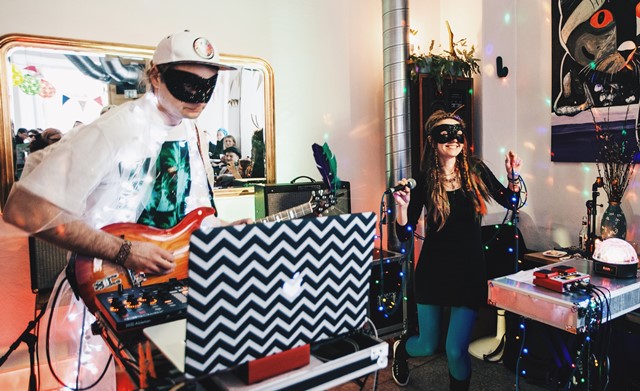 All this means experiences of Tallinn Music Week differ, with no potential cross-over. Nonetheless, the operative word remains music. During the day, the City Stage strand gives musicians platforms around the city. In the evenings, around 15 venues host shows with more than one stage at many. Everything is here: classical music, folk, hip-hop, jazz and metal. And from almost anywhere, though Estonia itself is represented to the greatest degree. Latvia, Lithuania and Russia show strong hands. The Nordic countries – especially nearby Finland – are out in force. So are the Lebanon and Syria.
All this means experiences of Tallinn Music Week differ, with no potential cross-over. Nonetheless, the operative word remains music. During the day, the City Stage strand gives musicians platforms around the city. In the evenings, around 15 venues host shows with more than one stage at many. Everything is here: classical music, folk, hip-hop, jazz and metal. And from almost anywhere, though Estonia itself is represented to the greatest degree. Latvia, Lithuania and Russia show strong hands. The Nordic countries – especially nearby Finland – are out in force. So are the Lebanon and Syria.
As with any event, but even more so here, choices have to be made. Snapshots then, with the host country taking precedence. In the tiny coffee shop August, Sädelev Kass (pictured above right, photo © Diana Pashkovich) are a nutty duo melding reggae and Robert Fripp’s guitar to space-rock aesthetics, and are out there on their own. The traditionally rooted accordion player Tuulikki Bartosik winningly showcases the serial music nature of polka.
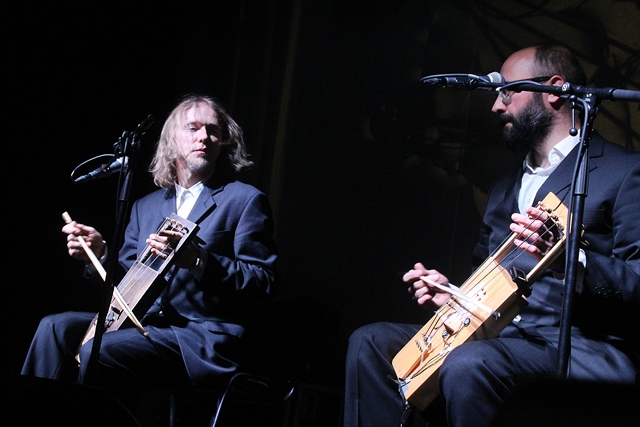 On a mainstream pop ticket but stranded on a stage in a shopping centre, electro-pop trio Würffel make the case they could be Estonia’s Aqua, though it’s hard not feel for them as distracted shoppers drift in and out of chain clothes shops. In a murky club, indie-rock quartet Frankie Animal are hampered by a singer on crutches but, at least for the first four songs, they win with a series of snappy new wave of New Wave short, sharp shocks. The plain-bonkers bowed-lyre duo Puuluup (pictured left, photo © Marina Puškar) ought to be on festival stages anywhere bringing joy. Both Mari Kalkun and Maarja Nuut are each magical, stemming from the traditional and taking it to new places: they are not for a folk audience only – an artistic migration in keeping with the questing defining Tallinn Music Week.
On a mainstream pop ticket but stranded on a stage in a shopping centre, electro-pop trio Würffel make the case they could be Estonia’s Aqua, though it’s hard not feel for them as distracted shoppers drift in and out of chain clothes shops. In a murky club, indie-rock quartet Frankie Animal are hampered by a singer on crutches but, at least for the first four songs, they win with a series of snappy new wave of New Wave short, sharp shocks. The plain-bonkers bowed-lyre duo Puuluup (pictured left, photo © Marina Puškar) ought to be on festival stages anywhere bringing joy. Both Mari Kalkun and Maarja Nuut are each magical, stemming from the traditional and taking it to new places: they are not for a folk audience only – an artistic migration in keeping with the questing defining Tallinn Music Week.
From beyond the borders, Latvia’s Alise Jostes’s sparse singer-songwriter introspection is lifted by sympathetic framing from her two accompanists. Affecting and assured, she would sit comfortably with a label like Bella Union. Finland’s The Hearing did not have congenial settings – a hotel lobby and the ante-room of a venue elsewhere – but telegraphed a Nico-like intensity tempered with an innate sense for sepulchral melody. Wonky Finnish jazzers Elifantree bolted techno to Nina Simone and ended up as a strange distorted echo of Annette Peacock. Britain’s The Revolutionary Army of the Infant Jesus were immersive and spellbinding, while our own The Membranes’ pitch-and-roll post punk was teamed with the lightning-flash voices of Estonia’s Chamber Choir Sireen.
 The nominally jazz Lithuanian trio Sheep Got Waxed dealt in what was actually close to early King Crimson prog. Kudos too for Lithuania's world-class Garbanota Bosistas and a compelling yanking of Ariel Pink onto the dance floor. Liima (pictured right, photo © Madis Särglepp), a union of Denmark’s Efterklang and Finnish percussionist Tatu Rönkkö, were splendid, energised and propulsive. The view of them as a project has evaporated and they are now a band.
The nominally jazz Lithuanian trio Sheep Got Waxed dealt in what was actually close to early King Crimson prog. Kudos too for Lithuania's world-class Garbanota Bosistas and a compelling yanking of Ariel Pink onto the dance floor. Liima (pictured right, photo © Madis Särglepp), a union of Denmark’s Efterklang and Finnish percussionist Tatu Rönkkö, were splendid, energised and propulsive. The view of them as a project has evaporated and they are now a band.
Tallinn Music Week feels infinite, as though it could and wants to encapsulate anything. No longer a boutique festival but nonetheless retaining an enviable intimacy, it has a voracious appetite for bringing things together. In many ways, though commercial and not countercultural, it has become akin to an unselfconscious Sixties happening but with a 21st century scale, organisation and technology. The driving sensibility is a modern take on let’s-change-the-world. The growth it has experienced – ideologically and in scale – does mean it is now hard to get a handle on, though.
Does this matter? Not really. It is not a negative. Anything can be taken from Tallinn Music Week. It could be enough to see a few bands and drink a beer. Or maybe, to revisit President Ilves’ exhortation, to also become one of “an army of creative people saving our Europe and our freedom”. The options are there. And saving our Europe is not going to be done from the outside.
Share this article
Add comment
The future of Arts Journalism
You can stop theartsdesk.com closing!
We urgently need financing to survive. Our fundraising drive has thus far raised £49,000 but we need to reach £100,000 or we will be forced to close. Please contribute here: https://gofund.me/c3f6033d
And if you can forward this information to anyone who might assist, we’d be grateful.

Subscribe to theartsdesk.com
Thank you for continuing to read our work on theartsdesk.com. For unlimited access to every article in its entirety, including our archive of more than 15,000 pieces, we're asking for £5 per month or £40 per year. We feel it's a very good deal, and hope you do too.
To take a subscription now simply click here.
And if you're looking for that extra gift for a friend or family member, why not treat them to a theartsdesk.com gift subscription?
more New music
 Slovenian avant-folk outfit Širom’s 'In the Wind of Night, Hard-Fallen Incantations Whisper' opens the door to inner space
Unconventional folk-based music which sounds like nothing else
Slovenian avant-folk outfit Širom’s 'In the Wind of Night, Hard-Fallen Incantations Whisper' opens the door to inner space
Unconventional folk-based music which sounds like nothing else
 'The Art of Loving': Olivia Dean's vulnerable and intimate second album
Neo soul Londoner's new release outgrows her debut
'The Art of Loving': Olivia Dean's vulnerable and intimate second album
Neo soul Londoner's new release outgrows her debut
 Music Reissues Weekly: The Peanut Butter Conspiracy - The Most Up Till Now
Definitive box-set celebration of the Sixties California hippie-pop band
Music Reissues Weekly: The Peanut Butter Conspiracy - The Most Up Till Now
Definitive box-set celebration of the Sixties California hippie-pop band
 Doja Cat's 'Vie' starts well but soon tails off
While it contains a few goodies, much of the US star's latest album lacks oomph
Doja Cat's 'Vie' starts well but soon tails off
While it contains a few goodies, much of the US star's latest album lacks oomph
 Mariah Carey is still 'Here for It All' after an eight-year break
Schmaltz aplenty but also stunning musicianship from the enduring diva
Mariah Carey is still 'Here for It All' after an eight-year break
Schmaltz aplenty but also stunning musicianship from the enduring diva
 Album: Solar Eyes - Live Freaky! Die Freaky!
Psychedelic indie dance music with a twinkle in its eye
Album: Solar Eyes - Live Freaky! Die Freaky!
Psychedelic indie dance music with a twinkle in its eye
 Album: Night Tapes - portals//polarities
Estonian-voiced, London-based electro-popsters' debut album marks them as one to watch for
Album: Night Tapes - portals//polarities
Estonian-voiced, London-based electro-popsters' debut album marks them as one to watch for
 Album: Mulatu Astatke - Mulatu Plays Mulatu
An album full of life, coinciding with a 'farewell tour'
Album: Mulatu Astatke - Mulatu Plays Mulatu
An album full of life, coinciding with a 'farewell tour'
 Music Reissues Weekly: Sly and the Family Stone - The First Family: Live At Winchester Cathedral 1967
Must-have, first-ever release of the earliest document of the legendary soul outfit
Music Reissues Weekly: Sly and the Family Stone - The First Family: Live At Winchester Cathedral 1967
Must-have, first-ever release of the earliest document of the legendary soul outfit
 Album: Robert Plant - Saving Grace
Mellow delight from former Zep lead
Album: Robert Plant - Saving Grace
Mellow delight from former Zep lead
 Brìghde Chaimbeul, Round Chapel review - enchantment in East London
Inscrutable purveyor of experimental Celtic music summons creepiness and intensity
Brìghde Chaimbeul, Round Chapel review - enchantment in East London
Inscrutable purveyor of experimental Celtic music summons creepiness and intensity
 Album: NewDad - Altar
The hard-gigging trio yearns for old Ireland – and blasts music biz exploitation
Album: NewDad - Altar
The hard-gigging trio yearns for old Ireland – and blasts music biz exploitation

Comments
Heartfelt analysis of the
Heartfelt analysis of the drive behind this extraordinary country - thanks, Kieron. Of all the European countries, Estonia has shown most consistently what can be achieved within an essential framework. And they know that Putin is always there, waiting to pounce. The Brexiters will let this happen if they get their way. Check their links to Russia.